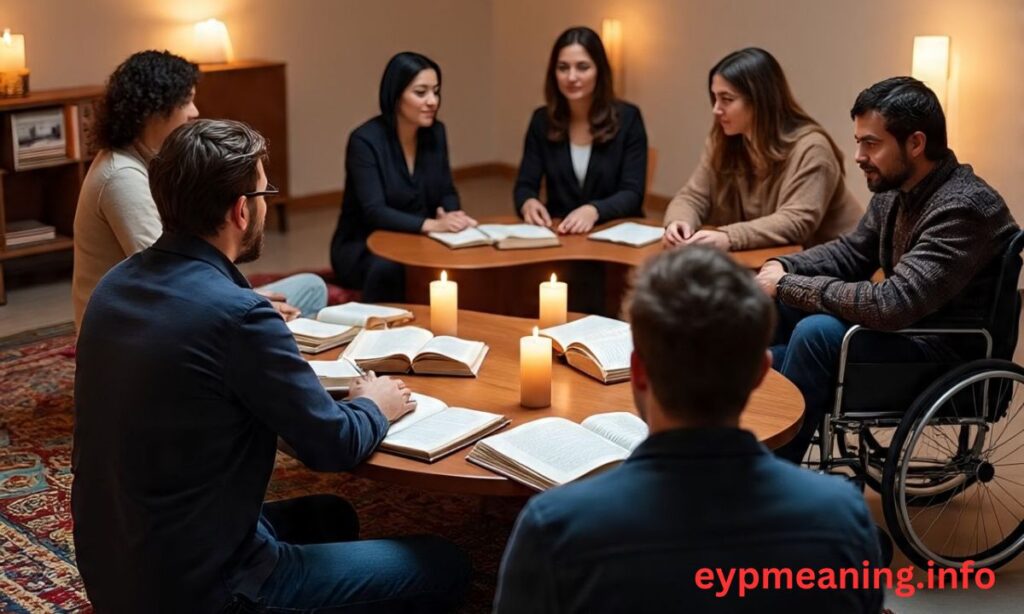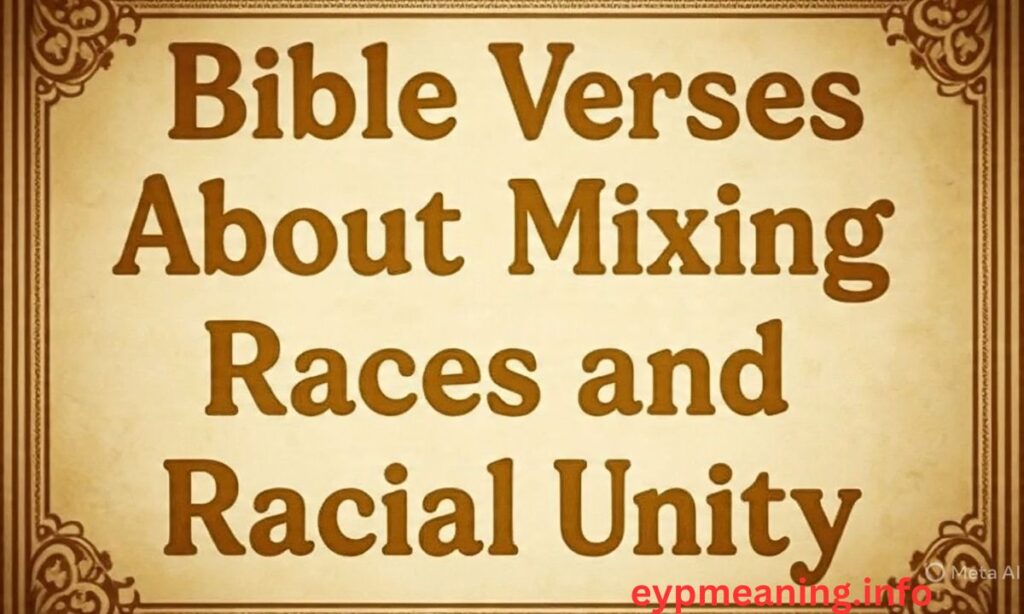The Bible has a lot to say about how people from different races should treat each other. God’s word shows us that He loves all people equally. From the very beginning, Scripture teaches that all humans come from one family. The Bible never supports racial separation or hatred. Instead, it calls Christians to love and accept everyone regardless of their skin color or background.
Throughout the Old and New Testament, we see God welcoming people from every nation. Jesus himself broke down barriers between different ethnic groups. The early church struggled with these issues but learned to embrace diversity.
Unity Among Believers
1. Galatians 3:28
“There is neither Jew nor Gentile, neither slave nor free, neither male nor female, for you are all one in Christ Jesus.”
Paul emphasizes the complete equality of all believers in Christ, regardless of ethnic, social, or gender distinctions. This verse abolishes traditional barriers and establishes unity as a fundamental Christian principle.
2. Colossians 3:11
“Here there is no Gentile or Jew, neither circumcised nor uncircumcised, neither Barbarian, Scythian, neither slave nor free, but Christ is all, and is in all.”
Paul reinforces that Christ unifies all people, eliminating ethnic and cultural distinctions. All believers share a common identity in Him, transcending their backgrounds.
3. Ephesians 2:14
“For he himself is our peace, who has made the two groups one and has destroyed the barrier, the dividing wall of hostility.”
Christ is described as breaking down barriers between different ethnic groups (Jews and Gentiles), promoting peace and reconciliation between previously hostile communities.
4. Revelation 7:9
“After this I looked, and there before me was a great multitude that no one could count, from every nation, tribe, people and language, standing before the throne and before the Lamb.”
John’s heavenly vision shows people from every ethnic and linguistic background worshiping together, depicting the ultimate inclusive reality of God’s kingdom.
5. Acts 10:34-35
“Then Peter began to speak: ‘I now realize how true it is that God does not show favoritism but accepts from every nation the one who fears him and does what is right.'”
Peter acknowledges God’s impartiality – His acceptance is based on righteousness and reverence, not racial or national identity.
6. Romans 10:12
“For there is no difference between Jew and Gentile—the same Lord is Lord of all and richly blesses all who call on him.”
Paul emphasizes equal opportunity for salvation and God’s blessings for all people, regardless of ethnic background.
7. 1 Corinthians 12:13
“For we were all baptized by one Spirit so as to form one body—whether Jews or Gentiles, slave or free—and we were all given the one Spirit to drink.”
Spiritual unity through the Holy Spirit transcends ethnic and social differences, creating one unified body of believers.
8. John 4:21-24
“‘Woman,’ Jesus replied, ‘believe me, a time is coming when you will worship the Father neither on this mountain nor in Jerusalem… God is spirit, and his worshipers must worship in the Spirit and in truth.'”
Jesus tells the Samaritan woman that worship transcends ethnic boundaries and specific locations, being accessible to all who worship in spirit and truth.
9. Acts 17:26
“From one man he made all the nations, that they should inhabit the whole earth; and he marked out their appointed times in history and the boundaries of their lands.”
Paul emphasizes humanity’s common origin in Adam, reinforcing that all people are part of one human family regardless of racial differences.
10. Micah 4:2
“Many nations will come and say, ‘Come, let us go up to the mountain of the Lord, to the temple of the God of Jacob. He will teach us his ways, so that we may walk in his paths.'”
The prophet envisions a future where people from many nations unite to seek and learn from God together.
Old Testament Teachings on Inclusivity

1. Genesis 12:3
“I will bless those who bless you, and whoever curses you I will curse; and all peoples on earth will be blessed through you.”
God’s promise to Abraham includes blessing for all peoples through his descendants, establishing an early vision of universal inclusivity.
2. Exodus 12:38
“Many other people went up with them, and also large droves of livestock, both flocks and herds.”
The Exodus included a diverse “mixed multitude,” not just Israelites, showing early inclusivity in God’s deliverance plans.
3. Leviticus 19:34
“The foreigner residing among you must be treated as your native-born. Love them as yourself, for you were foreigners in Egypt.”
God commands equal treatment and love for foreigners, reflecting His heart for inclusivity and justice.
4. Deuteronomy 10:19
“And you are to love those who are foreigners, for you yourselves were foreigners in Egypt.”
This reinforces empathy and love toward strangers based on Israel’s own experience as foreigners.
5. Ruth 1:16
“But Ruth replied, ‘Don’t urge me to leave you or to turn back from you. Where you go I will go, and where you stay I will stay. Your people will be my people and your God my God.'”
Ruth, a Moabite, demonstrates that commitment to God transcends ethnic boundaries and shows acceptance of foreigners into the faith community.
6. Isaiah 56:6-7
“And foreigners who bind themselves to the Lord… these I will bring to my holy mountain and give them joy in my house of prayer… for my house will be called a house of prayer for all nations.”
God promises to welcome and honor foreigners who worship Him, emphasizing the inclusive nature of salvation and worship.
7. Zechariah 2:11
“Many nations will be joined with the Lord on that day and will become my people.”
This prophecy anticipates widespread inclusion of many nations in God’s people, reflecting divine plans for diversity.
8. Jonah 4:11
“Should I not be concerned about that great city?”
God expresses compassion for Nineveh, a diverse foreign city, demonstrating His concern for all people regardless of their background.
9. Psalm 67:1-2
“May God be gracious to us and bless us… so that your ways may be known on earth, your salvation among all nations.”
The psalmist prays for blessings with the purpose of making God’s salvation known universally.
10. Malachi 1:14
“For I am a great King,” says the Lord Almighty, “and my name is to be feared among the nations.”
God’s universal significance and expectation of worship from all nations is emphasized.
Jesus’ Teachings on Inclusivity
1. Matthew 28:19
“Therefore go and make disciples of all nations, baptizing them in the name of the Father and of the Son and of the Holy Spirit.”
The Great Commission explicitly calls for discipleship across all ethnic and national boundaries.
2. Luke 10:30-37 (The Good Samaritan)
This parable teaches love and compassion for all people regardless of ethnic differences, showing that neighborly love transcends racial and cultural boundaries.
3. John 10:16
“I have other sheep that are not of this sheep pen. I must bring them also… and there shall be one flock and one shepherd.”
Jesus speaks of bringing together people from different backgrounds into one unified community.
4. Matthew 15:21-28
Jesus commends the faith of a Canaanite woman, demonstrating that faith in Him is not limited by ethnicity.
5. Mark 7:24-30
Jesus acknowledges the great faith of a Syrophoenician woman, affirming the inclusivity of God’s kingdom beyond Jewish communities.
6. John 4:9
“You are a Jew and I am a Samaritan woman. How can you ask me for a drink?”
Jesus breaks cultural norms by engaging with a Samaritan woman, challenging ethnic barriers.
7. Luke 4:25-27
Jesus references Old Testament examples where God’s prophets helped Gentiles, foreshadowing the inclusive nature of His mission.
8. John 1:29
“Look, the Lamb of God, who takes away the sin of the world!”
John the Baptist emphasizes the universal scope of Jesus’ redemptive work for all people.
9. Luke 13:29
“People will come from east and west and north and south, and will take their places at the feast in the kingdom of God.”
Jesus envisions a diverse gathering in God’s kingdom from all directions.
10. John 3:17
“For God did not send his Son into the world to condemn the world, but to save the world through him.”
This affirms the universal scope of Jesus’ mission to save all humanity.
The Early Church and Inclusivity

1. Acts 8:27-38 (The Ethiopian Eunuch)
Philip’s encounter and baptism of an Ethiopian eunuch highlights the early church’s outreach to non-Jews and Gentiles.
2. Acts 15:19-20
The Jerusalem Council’s decision not to impose Jewish laws on Gentile believers reflects a move toward inclusivity and acceptance of diverse backgrounds.
3. Acts 21:28
Paul faces accusations of bringing Greeks into the temple, reflecting tensions between Jewish traditions and the growing inclusivity of the early church.
4. Acts 22:21-22
Paul’s mission to the Gentiles and the hostile reaction it provoked illustrates the challenges of expanding Christianity beyond Jewish communities.
5. Acts 26:17-18
Paul describes his mission to both Jews and Gentiles, emphasizing the universal scope of the Gospel message.
6. Romans 15:7
“Accept one another, then, just as Christ accepted you, in order to bring praise to God.”
Paul encourages inclusivity and acceptance within the Christian community, mirroring Christ’s acceptance.
7. 1 Corinthians 9:19-23
Paul describes becoming “all things to all people” to reach diverse cultural contexts, demonstrating commitment to inclusive outreach.
8. Galatians 2:11-14
Paul confronts Peter for withdrawing from eating with Gentiles, underscoring the challenge of maintaining Gospel inclusivity.
9. Titus 2:3-5
Instructions for community life reflect inclusive Christian fellowship across different demographics.
10. Hebrews 13:2
“Do not forget to show hospitality to strangers, for by doing so some people have shown hospitality to angels without knowing it.”
This advocates for openness and inclusivity toward all people, including strangers.
Modern Reflections on Biblical Inclusivity
1. Acts 10:34-35 (Repeated)
Peter’s recognition of God’s impartiality serves as a foundation for understanding biblical inclusivity regarding race and ethnicity.
2. 1 John 4:7
“Dear friends, let us love one another, for love comes from God.”
Love that transcends racial and ethnic boundaries is presented as central to knowing God and Christian relationships.
3. James 2:1
“My brothers and sisters, believers in our glorious Lord Jesus Christ must not show favoritism.”
A direct call to avoid favoritism, promoting equality and respect regardless of racial or social differences.
4. Galatians 5:14
“For the entire law is fulfilled in keeping this one command: ‘Love your neighbor as yourself.'”
The fundamental Christian ethic of love encompasses all people, including those from different races and backgrounds.
5. 1 Peter 2:9
“But you are a chosen people, a royal priesthood, a holy nation, God’s special possession.”
Believers are described as having a unified, special identity that transcends ethnic divisions.
6. Ephesians 4:1-3
“Make every effort to keep the unity of the Spirit through the bond of peace.”
Paul calls for humility, patience, and unity among believers from diverse backgrounds.
7. 1 Corinthians 12:12-13 (Repeated)
The body metaphor emphasizes unity in diversity, with believers from different backgrounds forming one body in Christ.
8. Philippians 2:1-2
“Then make my joy complete by being like-minded, having the same love, being one in spirit and of one mind.”
Paul encourages a unified Christian community characterized by shared love and purpose.
9. Romans 12:16
“Live in harmony with one another. Do not be proud, but be willing to associate with people of low position.”
This promotes humility and harmony, encouraging believers to value people from all walks of life.
10. 1 John 3:11
“For this is the message you heard from the beginning: We should love one another.”
Love is reinforced as fundamental to Christian relationships, extending across all racial and social boundaries.
Conclusion
The Bible’s message is crystal clear – God wants all races to live together in love and harmony. These verses show that racial mixing and unity have always been part of God’s plan. From Genesis to Revelation, Scripture teaches that every person has equal value in God’s eyes. Christians are called to break down walls, not build them up.
As believers, we should follow Jesus’ example of loving people from every background. The Bible gives us no excuse for racism or racial separation. Instead, it calls us to celebrate our differences while remembering we are one human family. God’s kingdom includes every tribe, tongue, and nation worshipping Him together forever.






